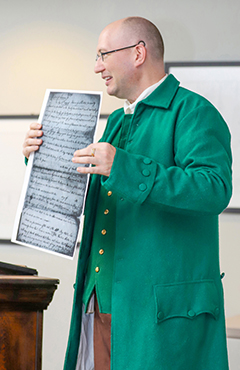
At Lander University, students don’t merely memorize important dates and facts. They’re challenged to think about how important events from our past influence our present and our future. And they do so with highly-credentialed faculty who are experts in their field.
On Independence Day, we spotlight Dr. Franklin Rausch, a Lander University professor of history who studies the American Revolutionary War. Rausch, who is a re-enactor at the Ninety Six National Historic Site, said the soldiers who fought for an independent United States can be considered America’s first veterans.
“I think we can say these soldiers were our first veterans, particularly if we go from the date of the establishment of the U.S. Army on June 14, 1775,” he said, noting that many of the men who fought in the American Revolution also fought in the French-Indian War from 1754-1763.
Pensions for Military Service
The Continental Congress, which governed America during the war, was notorious for not paying its bills, Rausch said.
Difficulties over pensions led to dissent after the war. But as the new U.S. government “was established and developed reliable means of revenue, it began to do more to support veterans,” he said. “The federal 1818 Pension Act provided support to poor Continental soldiers who served for at least nine months.”
By 1832, pension benefits were extended to militia and state soldiers, not only those in the Continental Army.
The Past Affects the Present
During the war, Rausch said, “There was a clear distinction between ‘officers,’ who had special privileges and could expect pensions and ‘men’ who were assumed not to. The American Revolution unleashed notions of equality that led people to ask why such a division existed.”
The war for independence helped change how veterans were seen. “Interestingly enough, there was a man who was awarded a pension owing to the service of his wife, Deborah Sampson, who joined the army and passed as a man throughout her service,” he said.
Records Tell a Story of Need
Rausch, who has studied the pension records of American Revolutionary War soldiers, said, “Two things struck me about reading the pension records. The first was how many of the soldiers were illiterate. They just made a mark for their name.”
The second, he said, “was just how poor they were.” For example, veteran George Abney, of South Carolina, gave his occupation as laborer and listed his possessions as four knives and forks, but only three spoons and plates, and a water bucket. “The poor guy apparently found it difficult to replace the missing plate and spoon.”
History Comes to Life at Lander
Students at Lander learn about the American Revolution in lower and upper-level classes from scholars, such as Rausch and other faculty who study the war. Rausch has created a series of war games that simulate the American Revolutionary war battles, and students have created a video about the 1775 Siege of Savages’ Old Fields in Ninety Six. Others have taken part in internships at historic sites through the University’s highly acclaimed Public History Program.
“We also work a lot of with the National Park Service at Ninety Six,” said Rausch. “Eric Williamson, of the National Park Service, did a great workshop this year to support our students who are interested in doing more in that area.”